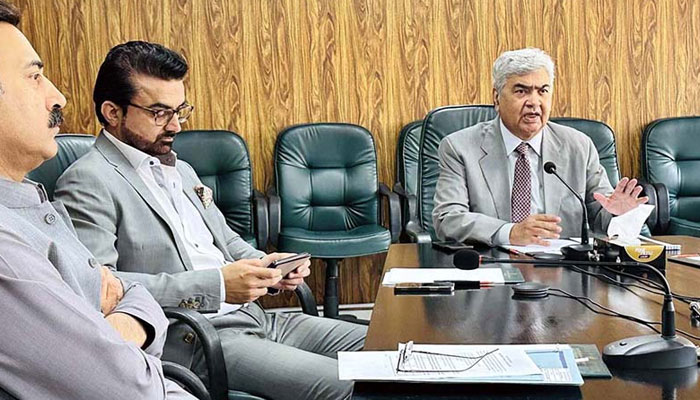Updated ‘Agro-Ecological Zones of Pakistan’ report launched at NARC
Islamabad : Dr. Kauser Abdulla Malik, Federal Minister for the Ministry of National Food Security and Research, chaired the launching event of the updated ‘Agro-Ecological Zones of Pakistan’ at the National Agricultural Research Centre (NARC) here, says a press release.
During his speech, Dr. Kauser commended the efforts of Pakistan Agricultural Research Council (PARC) scientists and stated that NARC is the centre of excellence and an exemplary organisation. He also emphasised the importance of establishing a dissemination mechanism to engage all stakeholders and suggested that provincial agricultural departments utilise the report.
The report offers a comprehensive overview of Pakistan’s updated agro-ecological zones, considering changing environmental conditions. It was prepared under the directive of the Ministry of National Food Security and Research, categorising Pakistan’s ecology into various zones and sub-zones with a specialized database. Initially PARC delineated 10 agro-ecological zones in 1980s with the knowledge and technologies available at that time. After about 40 years PARC has now redefined these zones with more precise data, technology and modern knowledge. Additionally, data on 25 crops, including 13 each of ‘khareef and Rabi’ crops suitable for different ecological zones, was developed. Chairman PARC, Dr. Ghulam Muhammad Ali, expressed gratitude to the Federal Minister for his keen interest in the report’s preparation, highlighting its significance in identifying appropriate crops for diverse ecological conditions nationwide. He said that identifying agro-ecological zones in Pakistan is crucial as it helps tailor agricultural practices to specific environmental conditions, maximising crop productivity. Understanding these zones can lead to more sustainable and profitable farming methods, better resource allocation, contributing to food security and economic growth in the region.
-
 Jerome Tang Calls Out Team After Embarrassing Home Defeat
Jerome Tang Calls Out Team After Embarrassing Home Defeat -
 Cynthia Erivo Addresses Bizarre Rumour About Her Relationship With Ariana Grande
Cynthia Erivo Addresses Bizarre Rumour About Her Relationship With Ariana Grande -
 Prince Harry, Meghan Markle Spotted Cosying Up At NBA All-Star Game
Prince Harry, Meghan Markle Spotted Cosying Up At NBA All-Star Game -
 Lady Gaga Explains How Fibromyalgia Lets Her 'connect With People Who Have It'
Lady Gaga Explains How Fibromyalgia Lets Her 'connect With People Who Have It' -
 Metro Detroit Weather Forecast: Is The Polar Vortex Coming Back?
Metro Detroit Weather Forecast: Is The Polar Vortex Coming Back? -
 Daniel Radcliffe Reveals Surprising Way Fatherhood Changed Him
Daniel Radcliffe Reveals Surprising Way Fatherhood Changed Him -
 ‘Disgraced’ Andrew At Risk Of Breaking Point As Epstein Scandal Continues
‘Disgraced’ Andrew At Risk Of Breaking Point As Epstein Scandal Continues -
 Alan Cumming Shares Plans With 2026 Bafta Film Awards
Alan Cumming Shares Plans With 2026 Bafta Film Awards -
 OpenClaw Founder Peter Steinberger Hired By OpenAI As AI Agent Race Heats Up
OpenClaw Founder Peter Steinberger Hired By OpenAI As AI Agent Race Heats Up -
 Kate Middleton's Reaction To Harry Stepping Back From Royal Duties Laid Bare
Kate Middleton's Reaction To Harry Stepping Back From Royal Duties Laid Bare -
 Rose Byrne Continues Winning Streak After Golden Globe Awards Victory
Rose Byrne Continues Winning Streak After Golden Globe Awards Victory -
 Ice Hockey Olympics Update: Canada Stays Unbeaten With Dominant Win Over France
Ice Hockey Olympics Update: Canada Stays Unbeaten With Dominant Win Over France -
 Brooklyn Beckham Makes This Promise To Nicola Peltz Amid Family Feud
Brooklyn Beckham Makes This Promise To Nicola Peltz Amid Family Feud -
 Chinese New Year Explained: All You Need To Know About The Year Of The Horse
Chinese New Year Explained: All You Need To Know About The Year Of The Horse -
 Canadian Passport Holders Can Now Travel To China Visa-free: Here's How
Canadian Passport Holders Can Now Travel To China Visa-free: Here's How -
 Maya Hawke Marries Christian Lee Hutson In New York Ceremony
Maya Hawke Marries Christian Lee Hutson In New York Ceremony




